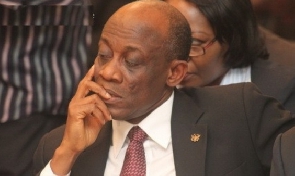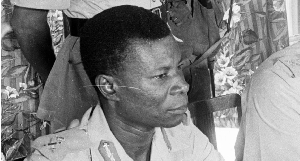Despite government’s approach of making money to fund critical projects in the country, Former Finance Minister, Seth Terkper, called on foreign donors to assist them to embark on developmental projects.
He was of the view that donors' support can help sustain the traditional approach of funding projects in the country.
Mr. Terkper said this at an international conference on financing the Sustainable Development Goals (SDGs).
Read the story orginally published in 2015 by BFT below.
Finance Minister Seth Terkper has called on foreign donors not to cut official development assistance to emerging countries, amidst attempts to seek capital resources from other avenues to fund critical projects.
He said the traditional approach to funding projects through tax revenue, domestic borrowing, external loans, and foreign grants has to be complemented by other financing strategies.
“Government is working assiduously to harness all resources toward the achievement of objectives. Options available to emerging economies should not distract from (official development assistance) ODA -- it is about diversification and not replacement; it is about a healthy balance and not shying away from traditional sources,” he said.
Mr. Terkper said this at an international conference on financing the Sustainable Development Goals (SDGs), successor to the Millennium Development Goals (MDGs) for the next 15 years.
Official development assistance (ODA, a term coined by the Development Assistance Committee (DAC) of the Organisation for Economic Cooperation and Development (OECD) to measure aid, is widely used as an indicator of international aid flow and includes some loans.
Sixty percent of Ghana's annual budget is donor-funded, but fiscal challenges and sound public financial management by the government has forced most of the country’s principal donors to withhold support. Figures from the Finance Ministry show that over the last two years donors have withheld more than US$700million in budgetary support, mainly because of government’s failure to check spending and raise enough revenue.
But arrival of the International Monetary Fund’s (IMF) programme for the next three years and a slowdown of the financial crisis in the west is expected to cause donor budgetary support to rebound.
Ghana successfully issued its third Eurobond in September last year, which raised US$1billion. With a 12-year maturity period, the coupon came at 8.1 percent and was used to pay down its debt to the Bank of Ghana.
The country issued its first Eurobond, of 10-year duration, eight years ago. The issue, which raised US$750million from investors at a coupon of 8.5 percent, made Ghana the first nation in sub-Saharan Africa after South Africa to borrow from international capital markets.
In 2013 Ghana successfully raised US$1billion from the international market in the second issue of a bond, which was heavily oversubscribed. It raised US$750million in cash and US$250million in a buy-back of the 2007 issue.
These show a shift in project financing from dependence on official development assistance to raising financial resources from the international capital market.
Mr. Terkper explained that lessons Ghana has learnt from the BRICS and other emerging countries include grants for social infrastructure; capital markets and development banks for commercial projects; Ghana Infrastructure Investment Fund (GIIF) for harnessing oil resources, leveraging markets for project finance; and shift from unfettered sovereign guarantees.
“Government therefore has to strike a balance between borrowing levels that will jeopardise the country’s credit rating and solving the overarching problems of infrastructure development; hence the need for Public-Private Partnerships (PPPs),” he said.
He noted that in addition to the PPPs, government has established the Ghana Infrastructure Investment Fund to mobilise, manage, coordinate and provide financial resources for investment in commercial infrastructure projects, thus reducing the burden of public debt.
“Government’s medium-term policy direction is to work in close collaboration with the private sector to expand opportunities for all, and continue to strengthen the foundation for an accelerated socio-economic transformation,” he said.
Mr. Terkper told the participants that in addition to securing bilateral and multilateral funding, there will be need to identify alternative and innovative sources of funding as the continent moves into the future.
“Market mechanisms and private sector contributions also provide significant sources of funding,” he said. He urged participants to debate the long-term impact of new and potential flows from the capital markets and emerging power institutions on the overall architecture of development financing.
“The future envisaged for the next generation is one that must be sustainable, inclusive, and innovative. It must prepare some of our ‘Africa Rising’ countries to manage the risks posed by the capital markets in particular,” he noted.
Mr. Tekper noted that the lack of a developmental model in emerging economies is a challenge to economic growth and prosperity on the continent.
“It appears that the development finance institutions in particular have not devised a package from the Asian tigers and eastern European or EU-assisted experience to guide ‘Africanisation’,” he said. He urged participants to look at developing a model for ‘countries in transition’.
Business News of Friday, 20 March 2020
Source: www.ghanaweb.com













